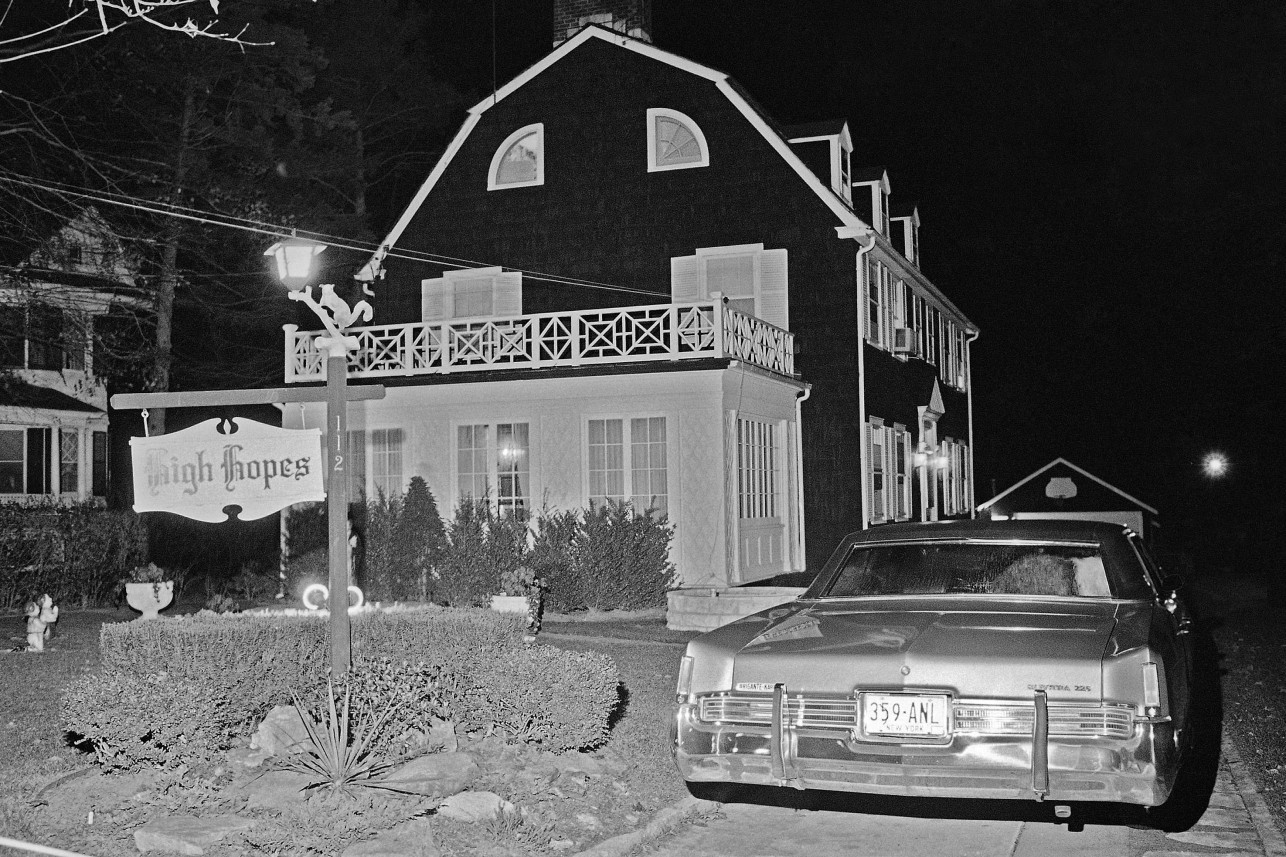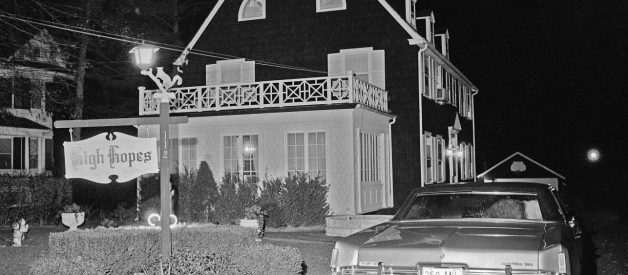 The house at 112 Ocean Ave., Amityville, NY. Courtesy AP.
The house at 112 Ocean Ave., Amityville, NY. Courtesy AP.
?In December 1975, the Lutz family moved into their new home on suburban Long Island? Twenty-eight days later, the entire Lutz family fled in terror.? So reads the jacket copy for The Amityville Horror, the bestselling book by Jay Anson. Later adapted to a blockbuster movie, the sensational story made the house at 112 Ocean Ave. America?s best-known haunted house.
The story of The Amityville Horror is so well known, it has become part of America?s folklore: a year after a gruesome mass murder took place there, George and Kathleen Lutz buy the huge Dutch Colonial for well below its value. However, very soon after moving in, the family (as well as some visitors) begins experiencing odd phenomena, such as swarms of flies in winter, disembodied voices, things moving seemingly by themselves, and visions of glowing red eyes. Kathleen begins having nightmares about the murders, and George wakes up at 3:15 a.m. every morning ? the time the murders were believed to have happened. These phenomena become more dangerous and frightening until one night, the family flees ?in terror,? taking only what they can carry.
What?s so interesting about this tale is that usually, after a murder, the site is said to be haunted by the ghosts of those who have died there. But not the Amityville house. The Lutzes ? and paranormal researchers who studied the house, Hans Holzer and Ed and Lorraine Warren ? claim the house isn?t haunted in the traditional sense, but is instead possessed by evil spirits. These same evil spirits, they claim, are what possessed Ronald DeFeo, Jr., to shoot his entire family 13 months before the Lutzes moved in.
But like many of the Lutzes? claims, it doesn?t hold up to scrutiny. Ronald DeFeo, Jr. ? known as ?Butch? to his friends and family ? didn?t need any supernatural help to kill his entire family on Nov. 13, 1974.
Butch was the second of five children of Ronald, Sr., and Louise DeFeo. The family has been described as loud and quarrelsome ? and that Ronald, Sr., was abusive to his wife and kids. Unsurprisingly, in such an environment, Butch began acting out from an early age. At 13, he attacked his grandfather and was taken to a child psychologist.
Ronald?s father owned a car dealership in Brooklyn, and when Ronald was given a well-paying position there, the family moved to the sprawling house in the upscale town of Amityville, New York. Louise christened it ?High Hopes? and began decorating the yard with shrines reflecting their Catholic faith. And indeed, the family wanted for nothing, financially anyway.
But in the more important ways, things were not much better at High Hopes for the DeFeo family. Ronald continued to be abusive; once, when Louise was coming up the stairs from the basement with a basket of laundry, Ronald punched her in the face so hard it knocked her down the stairs.
Butch, already troubled, spiraled out of control. Classmates described him as surly and violent, a ?spoiled brat.? He dropped out of high school at 17 and only worked sporadically.
Yet he always had plenty of money to spend on alcohol, drugs, and prostitutes. Friends said he had a heroin habit and did a lot of speed and LSD. Apparently, Butch was stealing at least $500 a week from his father, as well as anything else he could get away with.
Father and son fought frequently ? often coming to blows. A year before the murders, Butch pulled a gun on his father and pulled the trigger, but it misfired.
The situation came to a head two weeks before the murders. Butch and a co-worker had been told to go to the bank and deposit several thousand dollars in cash and checks for the dealership. They returned over two hours later, claiming to have been robbed. Their story fell apart when they couldn?t give a coherent description of the thief or account for their whereabouts during the two hours. Butch instead became combative and uncooperative with the police.
Ronald was furious, suspecting his son of stealing the business? money. The Friday before the murders, he confronted Butch at the dealership. Butch screamed, ?You fat pr ? k, I?ll kill you!? before getting into his car and speeding off.
The evening of Wednesday, Nov. 13, 1974, Butch ran into Henry?s Bar yelling that his family had been shot. The bar was close to his house, so he and several friends ran back home with him. There, they found all the members of the DeFeo family (except Butch) shot to death with a .35-caliber Marlin rifle. Ronald and Louise were in their bed upstairs; each of them had been shot twice. Seven-year-old John and 12-year-old Mark were also shot to death in their beds, as was 13-year-old Allison. Only 18-year-old Dawn appeared to have been awake; she had been shot in an attic room.
Right away there was one major inconsistency: the DeFeo family had been dead since around 3 a.m. that morning ? nearly 15 hours before Butch burst into the bar calling for help.
At the station, Butch said that he had been off work sick the previous day, but that morning, he had felt better and so had gone into his grandfather?s dealership to work. But there wasn?t much work for him there, he said, so he went home around lunch time.
When he got home, he said he realized he?d forgotten his house key, and there was no one home to let him in. So he went to Henry?s and hung out for most of the afternoon. It was only when he returned home that evening that he found his family murdered.
He insisted that this had been a mob hit. He claimed that his father had been in business with organized crime, but had botched a job for them, and this was their retaliation.
Under questioning, Butch changed his story each time, but every version included the mafia hitman. But nothing in any of his stories fit the facts of the case.
Eventually he broke down and confessed to the murders, saying, ?Once I started, I just couldn?t stop. It went so fast.? He said after he?d murdered his family, he showered, changed out of his blood-stained clothes, collected the cartridges, and wrapped the rifle and bloody clothes in a pillowcase. He then took the bloody clothes, rifle, and spent cartridges with him as he drove towards Brooklyn, first dropping the rifle and clothing off a dock at the end of his street, then hiding the cartridges in a drain in Brooklyn.
He then went to work as though nothing had happened. When he left early, he called his girlfriend and then spent the afternoon visiting with friends, drinking, and doing heroin. Throughout the day, he would call home and, of course, get no answer. After the group of friends arrived at Henry?s Bar, Butch acted worried and said he was going to have to break a window to get into his house. He left and returned just a few minutes later, yelling that his family had been shot.
He was charged with six counts of second-degree murder.
At his trial, Butch tried for an insanity plea. He had been evaluated by several court-appointed psychiatrists, but they were divided over whether he was actually insane or not. On the stand, he gave wildly varying accounts of the crimes and claimed that he heard voices and was possessed by Satan ? testimony the Lutzes later used to ?prove? their claims about the house.
The ploy nearly worked; the first jury vote came back 10?2, with two jurors unsure about his mental state at the time of the murders. But after reviewing the transcripts, the jury returned a unanimous verdict.
On Nov. 21, 1975, Ronald DeFeo, Jr., was found guilty of all six counts of second-degree murder. Two weeks later, he was sentenced to 25 years to life.
In the nearly 45 years since his conviction, Butch has given several different explanations for the murders, including that his sister Dawn was the shooter, and that he, Dawn, and two other friends committed the murders together.
He remains incarcerated at the Sullivan Correctional Facility in Fallsburg, New York. All of his appeals and requests to the parole board have been denied so far.
As for the house, it has since been renovated and given a new address in an effort to stem the tide of curious sightseers. None of the subsequent owners have reported any unexplained phenomena.
The town of Amityville seems to prefer to put the whole thing ? both the DeFeo murders and the subsequent haunting hoax ? behind them.
*Note: contains affiliate links

